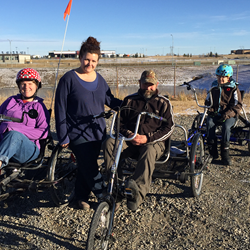
The Red Cross helped return a little piece of independence to a High River family after the 2013 floods damaged their most important means of transportation.
Two women with special needs, who rely on special adult road bikes (called trikes) to get around, were among thousands of people affected by torrential rains which flooded southern Alberta two years ago.
High River resident Lisa Mokry and her husband, Sean Phillips, live with the two ladies. Caroline has autism and Brenda has learning disabilities. (Their names have been changed to protect their privacy.)
During the flood, the family was evacuated from their home which sustained serious damage from the flood waters.
When the foursome was able to return, they discovered that Caroline and Brenda’s specialized, three-wheeled trikes – their main mode of transportation– had been irreparably damaged, along with trikes owned by Lisa and Sean.
The trikes were housed in the garage and ineligible for insurance compensation.
“Red Cross was our last hope,” says Lisa. “We were out of options.”
Caroline and Brenda use the trikes to get around town. The trikes greatly support the women’s independence and participation in the community, Lisa explains. The exercise also doubles as crucial physiotherapy for Caroline’s hip arthritis.
The special bikes are expensive to replace (with costs starting at $3,000 each), and can only be found in Montana.
Lisa, who runs a salon out of their home, said the loss of the trikes had a big impact on the women.
“Brenda used her bike to go to her ball games, to work, and to visit friends and family,” she said. “She’d love taking the dogs for a bike ride. It was her lifeline to independence.”
Brenda would often be reduced to tears because she worried about getting to appointments and obligations. Caroline also became more withdrawn, Sean said, because she sorely missed regular rides around the lake that the family took together.
“To see them go through that was hard,” Lisa recalls.
They approached the Red Cross and were connected with a recovery caseworker.
“It was definitely the most unique case I’ve worked on thus far,” says Tammy Leroux.
“It was also my first. I feel so fortunate that I was given this opportunity and thrilled to see it come to fruition.”
The Red Cross was able to offer funding to replace all four trikes, allowing the family to resume their lives as mobile, connected, active members of the community.
“The key to building resiliency is helping individuals feel empowered. We try to fill gaps. Our assistance is only a stepping stone within a larger, long-term recovery,” explained Matthew Collings, a Red Cross supervisor in High River at the time.
“We’re incredibly grateful,” Lisa says.